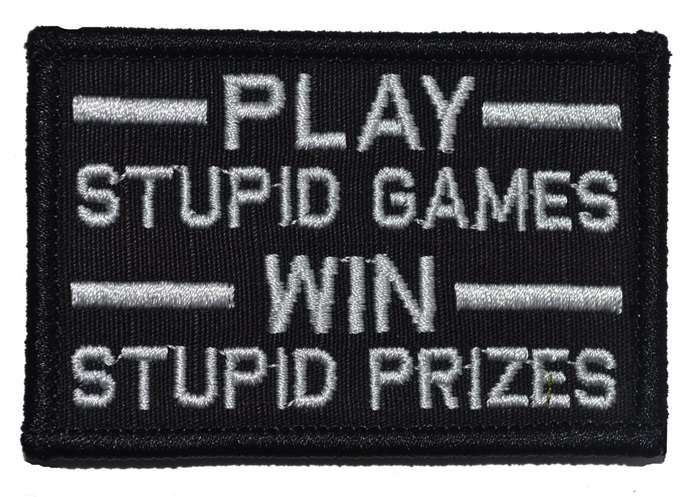Life is full of choices, and every decision we make has consequences. The idiom “play stupid games, win stupid prizes” has become a viral phrase over the last few years, reflecting the sentiment that reckless or foolish actions will inevitably lead to undesirable results. This catchy phrase is more than just an internet meme; it’s a powerful reminder that the choices we make, especially the ill-conceived ones, often come back to haunt us.
In this article, we’ll dive deep into the origins of the phrase, its applications in modern life, and how it has evolved into a guiding principle for many. We’ll explore real-life examples of how playing “stupid games” can lead to regretful outcomes, both in everyday situations and larger societal contexts.
The Origin of “Play Stupid Games, Win Stupid Prizes”

The exact origin of the phrase is difficult to pinpoint, but its first uses were likely within online communities, where people would mock or criticize others for engaging in reckless behavior. It quickly gained traction, particularly in response to videos or stories where someone’s irresponsible actions led to an unfortunate or humorous consequence. The phrase has since become ubiquitous on social media platforms, particularly Twitter, Reddit, and Instagram.
The Meaning Behind the Words
The idiom can be broken down into two parts:
- Play Stupid Games: This part of the phrase refers to engaging in activities, behaviors, or decisions that are clearly unwise, dangerous, or destined for failure.
- Win Stupid Prizes: The second half of the idiom emphasizes that engaging in such foolishness will likely result in consequences that are equally undesirable, often reflecting the nature of the foolish behavior itself.
In essence, it serves as a warning: if you engage in careless actions, be prepared for the inevitable fallout.
Everyday Examples of “Play Stupid Games, Win Stupid Prizes”
The idiom applies to everyday life in countless ways. Whether it’s in personal relationships, careers, or even small daily decisions, there are numerous ways in which people play “stupid games” and end up with “stupid prizes.”
Ignoring Health Advice
Let’s say someone is warned by their doctor to stop smoking because of the risk of lung cancer. Instead of quitting, they choose to ignore the advice and continue smoking for years. Eventually, they develop serious health problems. This is a classic case of playing a “stupid game” and winning the “stupid prize” of poor health. The decision to ignore sound medical advice led to consequences that could have been avoided.
Financial Recklessness
Many people fall into the trap of spending beyond their means, accumulating credit card debt, or investing in risky ventures without understanding the implications. When the bills pile up or the risky investments fail, these individuals find themselves facing financial ruin. Once again, a foolish decision led to an undesirable outcome, reinforcing the concept of “play stupid games, win stupid prizes.”
Social Media Oversharing
In today’s world of oversharing, people often post personal or sensitive information online without considering the long-term consequences. Whether it’s airing dirty laundry, sharing inflammatory opinions, or participating in dangerous online challenges, many have seen their actions backfire. Jobs have been lost, relationships have been ruined, and reputations have been damaged because people played “stupid games” on the internet. The “stupid prize” often comes in the form of public humiliation or worse.
The Phrase in Pop Culture and Viral Fame
One of the reasons why “play stupid games, win stupid prizes” has become so widespread is its ability to be applied across numerous situations, making it easily relatable. Its virality is also rooted in its use as a witty response to a wide range of content, from embarrassing celebrity moments to outlandish online challenges gone wrong.
The Rise of the Meme
As with many modern idioms, “play stupid games, win stupid prizes” found its way into the meme culture. Users on social media platforms, particularly Reddit and Twitter, often use the phrase as a caption for videos or images where individuals engage in reckless or irresponsible behavior with predictable, negative consequences. From someone attempting a dangerous stunt to a criminal caught in the act, the phrase is a perfect shorthand for “you should have known better.”
Examples in the News and Media
Beyond memes and viral videos, the phrase has also been applied in news stories to highlight cases of people engaging in behavior that leads to disastrous results. Think of stories where individuals refuse to follow safety protocols, whether at work or during a pandemic, and later face serious consequences. It has been used in political contexts, too, where leaders or individuals make poor choices, leading to avoidable crises.
In a world where accountability and cause-and-effect are ever more scrutinized, the phrase succinctly captures a universal truth.
Real-Life Stories of “Stupid Games” and “Stupid Prizes”

We’ve all witnessed situations where reckless behavior leads to disastrous consequences. These real-life examples further emphasize how this idiom plays out in everyday life.
The Tide Pod Challenge
One of the more absurd trends that gained attention in recent years was the “Tide Pod Challenge.” Teenagers filmed themselves eating laundry detergent pods, despite widespread warnings about the potential health risks. Unsurprisingly, many participants ended up in the hospital with severe health issues. The “stupid game” was engaging in a dangerous and pointless challenge, and the “stupid prize” was a trip to the emergency room.
Defying Weather Warnings
Another example can be found in those who choose to ignore severe weather warnings. When authorities warn of hurricanes or tornadoes, most people evacuate or take cover. However, there are always a few who choose to ignore the warnings and stay in dangerous areas, thinking they can ride out the storm. Unfortunately, many of these individuals face tragic consequences when their homes are destroyed, or they are injured. The “stupid prize” in this case is the destruction of property or, in some cases, loss of life.
Reckless Driving
Reckless driving is another example of a “stupid game” that often results in tragic consequences. Speeding, driving under the influence, or participating in illegal street races are dangerous activities. The inevitable “stupid prize” could be a serious accident, legal trouble, or worse. In these cases, the individuals knew the risks but chose to play the game anyway.
The Role of Ego and Overconfidence
One common thread in many examples of “play stupid games, win stupid prizes” is the role of ego and overconfidence. People often engage in reckless behavior because they believe they are immune to the consequences. This false sense of invincibility leads them to take unnecessary risks, believing that they won’t face the same outcomes as others.
Ignoring Advice and Warnings
Overconfidence often leads individuals to ignore advice or warnings from others, believing they know better. In doing so, they set themselves up for failure. Whether it’s ignoring expert advice, dismissing rules, or believing they are the exception to the rule, these individuals eventually discover that they, too, are susceptible to the same consequences.
The Psychology Behind Risky Behavior
Psychologists suggest that people who engage in risky behavior often do so because they are driven by the need for adrenaline or social validation. In some cases, they may be trying to impress others or seek approval, leading them to make irrational decisions. Unfortunately, the desire for approval or the thrill of the moment often overshadows the potential for long-term consequences.
Lessons to Be Learned
The idiom “play stupid games, win stupid prizes” may sound like a simple phrase, but it carries a powerful lesson about personal responsibility and the consequences of our actions. It serves as a reminder that decisions made without thought or care often lead to undesirable outcomes. By paying attention to this simple truth, we can avoid many pitfalls in life.
Think Before You Act
One of the most important takeaways from this phrase is the importance of thinking before you act. Many “stupid games” can be avoided by taking a moment to consider the potential consequences of your actions. Whether it’s deciding not to engage in reckless behavior, avoiding risky financial decisions, or simply considering the long-term effects of your choices, taking a step back can often prevent the “stupid prize” that follows.
Avoid Peer Pressure
Many people play “stupid games” because of peer pressure or the desire to fit in. Learning to resist this pressure and make decisions based on what’s best for you can save you from winning undesirable “prizes.” Surrounding yourself with people who encourage smart, thoughtful choices can also help you avoid falling into the trap of reckless behavior.
Related Post:
Big Brother Reindeer Games: A Winter Wonderland of Competition
2 Player Games Unblocked: The Ultimate Guide to Fun and Friendly Competition
OVO Cool Math Games: A Complete Guide to Mastering the Game
“Play stupid games, win stupid prizes” is more than just a viral phrase—it’s a cautionary tale for the modern age. It reminds us that our actions have consequences, and that reckless or thoughtless behavior will eventually catch up with us. From personal decisions to larger societal trends, this idiom encapsulates the wisdom that we should think before we act, weigh the consequences, and avoid unnecessary risks.
Whether you’ve seen it used as a humorous comment on social media or experienced the reality of it in your own life, the message remains the same: Make wise choices, and you’ll avoid winning “stupid prizes.”


